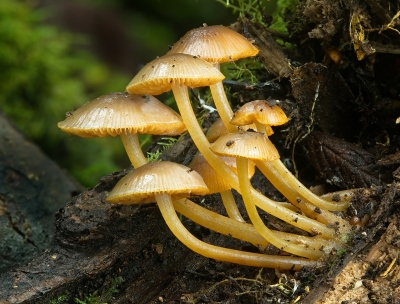
Mycology is the branch of biology concerned with the study of fungi, including their genetic and biochemical properties, their taxonomy and their use to humans as a source for tinder, traditional medicine, food, and entheogens, as well as their dangers, such as toxicity or infection.
Fungi are fundamental for life on earth in their roles as symbionts, e.g. in the form of mycorrhizae, insect symbionts, and lichens. Many fungi are able to break down complex organic biomolecules such as lignin, the more durable component of wood, and pollutants such as xenobiotics, petroleum, and polycyclic aromatic hydrocarbons. By decomposing these molecules, fungi play a critical role in the global carbon cycle.
Fungi and other organisms traditionally recognized as fungi, such as oomycetes and myxomycetes (slime molds), often are economically and socially important, as some cause diseases of animals (such as histoplasmosis) as well as plants (such as Dutch elm disease and rice blast).[citation needed]
Apart from pathogenic fungi, many fungal species are very important in controlling the plant diseases caused by different pathogens. For example, species of the filamentous fungal genus Trichoderma considered as one of the most important biological control agents as an alternative to chemical based products for effective crop diseases management.
Field meetings to find interesting species of fungi are known as ‘forays’, after the first such meeting organized by the Woolhope Naturalists’ Field Club in 1868 and entitled “A foray among the funguses”.
Some fungi can cause disease in humans and other animals – The study of pathogenic fungi that infect animals is referred to as medical mycology.
Picture Credit : Google

